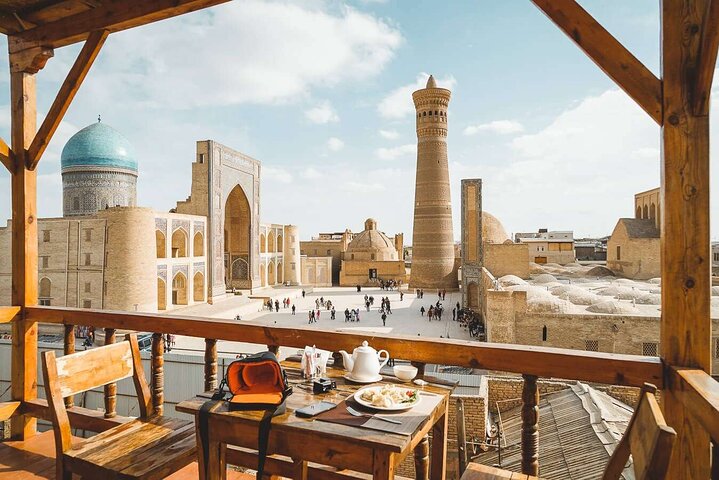Echoes of Bukhara: A Cultural Tapestry of Crafts and Cuisine
Drawn by the allure of Bukhara’s rich history and culture, I embarked on a journey that promised not just exploration, but introspection. The Bukhara Cultural Tour offered a tapestry of experiences, weaving together the city’s crafts, cuisine, and traditions into a narrative of discovery.
A Journey Through Time and Craft
Bukhara, a city that whispers tales of ancient times, welcomed me with open arms. As I embarked on the Bukhara Cultural Tour, I was eager to delve into the heart of its rich tapestry of history and culture. Kamilla, our guide, was a beacon of knowledge and warmth, her passion for her city evident in every word she spoke. Her unique approach, weaving messages from the past into our journey, added a layer of depth that resonated with my own quest for understanding and introspection.
We began our exploration at the Samanid Mausoleum, a testament to the architectural prowess of the 9th and 10th centuries. The simplicity of its brickwork, devoid of colorful tiles, spoke volumes of the era’s aesthetic sensibilities. Kamilla’s insights into the symbolic shapes of different religions embedded in the structure were fascinating, offering a glimpse into the spiritual confluence that Bukhara has witnessed over the centuries.
As we moved through the city, each site unfolded like a chapter in a book, revealing stories of resilience and transformation. The Ark of Bukhara, with its ancient ruins, stood as a silent witness to the passage of time, while the Great Minaret of the Kalon, steadfast and unyielding, whispered secrets of its storied past. Kamilla’s ability to bring these tales to life was nothing short of magical, her narratives painting vivid pictures in my mind.
The Artisans’ Touch
Bukhara’s soul is intricately woven into its crafts, and Kamilla ensured we experienced this firsthand. We visited workshops where artisans practiced age-old techniques, their hands moving with a grace and precision honed over generations. The blacksmith’s forge was a symphony of clanging metal, each strike a note in a melody of creation. Watching the gold embroidery process was akin to witnessing a dance, the needle weaving threads of history into fabric.
Kamilla’s connections with these craftsmen allowed us a rare glimpse into their world. Her respect for their craft was palpable, and it was clear that she was not just a guide but a bridge between us and the living heritage of Bukhara. The opportunity to participate in a masterclass, crafting our own small pieces, was a highlight, a tangible memory to carry home.
The trading domes, bustling with activity, were a sensory delight. The air was thick with the scent of spices, and the vibrant colors of textiles dazzled the eye. Here, Kamilla’s stories of trade and commerce in ancient Bukhara came alive, her words painting a picture of a city that was once a hub of the Silk Road, a melting pot of cultures and ideas.
Culinary Connections
No journey is complete without savoring the flavors of a place, and Bukhara’s cuisine is a reflection of its diverse cultural influences. Kamilla guided us through a culinary adventure, introducing us to local delicacies that were as rich in flavor as they were in history. From the hearty plov to the delicate samsa, each dish was a revelation, a testament to the region’s culinary heritage.
The highlight was a masterclass in traditional bread-making, where we learned the art of crafting the perfect loaf. The process was meditative, the rhythm of kneading dough a soothing counterpoint to the bustling city outside. As the bread baked, filling the air with its warm, comforting aroma, I found myself reflecting on the simple joys of creation and the connections forged through shared experiences.
Kamilla’s recommendations for dining spots were impeccable, each venue offering a unique perspective on Uzbek cuisine. Her openness and willingness to share her personal experiences added a layer of authenticity to the tour, making it not just a journey through Bukhara, but a journey into the heart of its people.
In the end, the Bukhara Cultural Tour was more than just a tour; it was an exploration of identity, both of a city and of myself. As I wandered through Bukhara’s ancient streets, I found echoes of my own journey, a reminder that the past is always present, shaping who we are and who we aspire to be.



















































